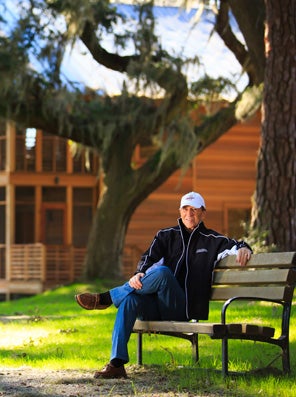WHAT WILL YOU MISS MOST ABOUT BEING PRESIDENT?
I’ll miss the people that I work with and the day-to-day excitement of the job. Leading a diverse, complex, sophisticated organization like the College is a challenge, but it is fun, and I’ll miss it.
WHAT ASPECT OF THE STUDENT EXPERIENCE AT THE COLLEGE IS MOST IMPORTANT TO YOU?
The student-focused culture that the faculty have developed over the years sets the College apart from nearly all other mid-sized and large universities.
WHAT IS YOUR FAVORITE LOCATION ON CAMPUS?
I have a great view of the Cistern Yard from my office in Randolph Hall. But in terms of interacting with students, faculty and staff, I enjoy the patio of Addlestone Library overlooking Rivers Green.
WHAT ALUMNI ACHIEVEMENT HAS MOST IMPRESSED YOU?
Arlinda Locklear, Class of 1973, becoming the first Native American woman to argue a case before the United States Supreme Court.
WHERE WOULD YOU LIKE TO SEE THE COLLEGE IN 20 YEARS?
We are now moving toward becoming what we are calling an emerging research university. My hope is that in 20 years, the College will be part of a research university called Charleston University, which would include the College, MUSC and the Charleston School of Law.
A research university would produce talent, create economic development opportunities and help Charleston to compete with the likes of Austin, Texas; the Research Triangle; Boston; Northern Virginia; and Silicon Valley.
WHAT IS YOUR FAVORITE PART OF BEING PRESIDENT?
Envisioning the future and working with the faculty and the staff to get us there.
WHAT ARE THE BIGGEST CHALLENGES FACING THE COLLEGE?
There are several. We need more land. We are landlocked in the historic district with no room to grow or improve our facilities. Another is convincing the state to let the College set its own tuition level. Tuition is currently capped by the state. A third is adding a few doctoral and master’s programs to support the rapidly transforming Charleston economy.
WHAT BOOK HAS HAD THE MOST INFLUENCE ON YOUR STYLE OF LEADERSHIP?
Built to Last by Jim Collins and Jerry Porras. It’s about how to build an organization to last. The material in that book on strategic planning had the most influence on our Strategic Plan and previous strategic plans that I have developed at Rutgers and the University of Georgia.
WHY HAS DIXIE PLANTATION BEEN SO IMPORTANT TO YOU?
Dixie is important because of the opportunity that it represents for our students and our faculty. We are turning it into a sustainability and environmental sciences campus that will be used by students from any and all disciplines. It will give us a historic downtown campus and a plantation campus, just 17 miles away on the Intracoastal Waterway – the Stono River. We’ll have the best of two different worlds – the best of a natural environment and the best of an urban environment.
IF MONEY WERE NO OBJECT, WHAT NEW BUILDING OR FACILITY FOR THE COLLEGE WOULD TOP YOUR WISH LIST?
Three buildings and more land:
1. A learning center that would be built on the parking lot of Addlestone Library. This is already called for in our Campus Master Plan. The building will be set up for distance education and for classes to work in teams. It will be a facility devoted to the knowledge economy as symbolized by the Internet and new media and all the educational opportunities that they represent.
2. A conference center at Dixie Planation.
3. A residence hall at Dixie Plantation.
4. 10–80 acres on or near Charleston’s peninsula for expansion of our facilities.
WHAT WAS YOUR MOST MEMORABLE MOMENT AS PRESIDENT?
Beating UNC, the defending NCAA champions in men’s basketball, in TD Arena on January 4, 2010. I also love spring commencement in the Cistern Yard. It is one of the most beautiful and unique commencement ceremonies in the country. I thoroughly enjoy how we parade out to rock ’n’ roll music during the recessional.
YOU OFTEN TALK ABOUT THE INTERDEPENDENT RELATIONSHIP BETWEEN THE COLLEGE AND THE CITY OF CHARLESTON. HOW ESSENTIAL IS THE SUCCESS OF ONE TO THE OTHER?
The College is Charleston and Charleston is the College. The city would be a shadow of itself without the energy and economic impact of the College, its students, parents, faculty and staff. On the other hand, the history, traditions, culture, environment and beauty of Charleston are what attract so many of our students, faculty and staff to the College. Few colleges and college towns are as interdependent as the College of Charleston and Charleston.
WHAT IS THE BIGGEST DIFFERENCE BETWEEN COLLEGE STUDENTS TODAY AND WHEN YOU FIRST BECAME A PROFESSOR IN 1977?
Students’ postgraduation goals have changed dramatically. When I was in college and when I started teaching at the University of Minnesota, students typically set their sights on getting the best job they could, no matter where it was located. Today, students are more in touch with quality-of-life issues. They pick a region that suits their desired lifestyle and look for the best jobs in that region. Our students want more controlled, less stressful lives than their Baby-Boomer parents.
WHAT STUDENT ACHIEVEMENT HAS IMPRESSED YOU THE MOST?
It’s hard to pick only one because we have some of the best and brightest students in the country attending the College. Some of our students have discovered a planet and others have conducted research to save the coral reefs. We also have remarkable student-athletes who excel inside and outside the classroom. I am so proud of all our student achievements. They bring distinction to the College and help to elevate our national profile.
WHAT WAS YOUR TOUGHEST DECISION AS PRESIDENT?
Without question, it was the decision to step down this summer. I’ve worked day and night for over seven years to nurture and care for this very special college. It’s very difficult to step aside and let someone else lead the institution you love.





